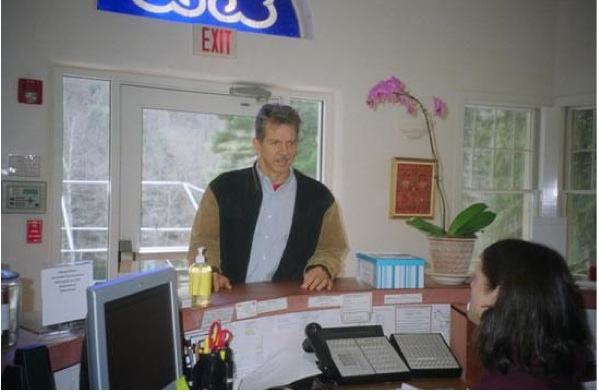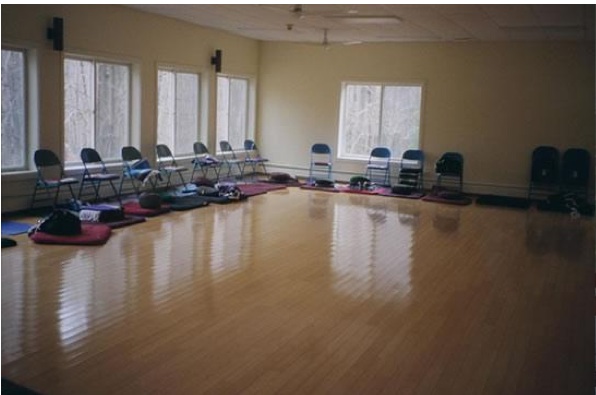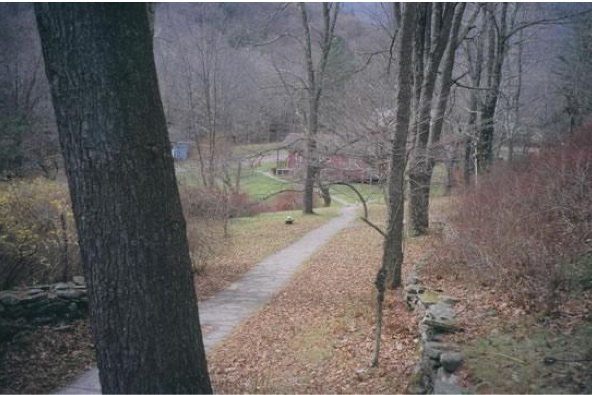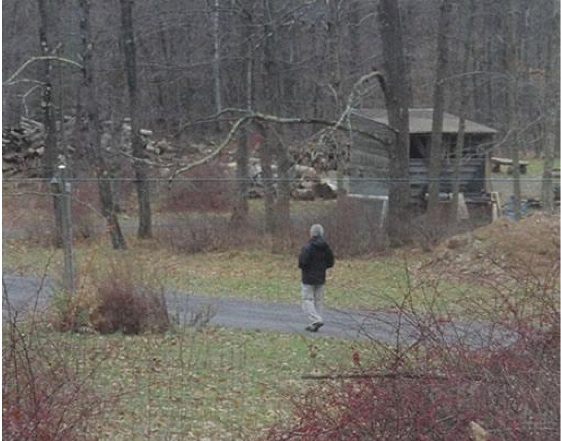The more you learn about mindfulness the more it becomes clear that Jon Kabat-Zinn is the go-to-guy for all things mindfulness related. He's talked to Oprah and the Dalai Lama about mindfulness, written best-selling books, coauthored research studies and created a mindfulness-based clinic at the University of Massachusetts Medical Center. So when I got the chance to join him on a six day mindfulness retreat with 35 other people, I jumped at it.
Friday Day 1

Here I am arriving at Meditation Retreat Center on the first day.
"Welcome," Jon Kabat-Zinn announced after we'd taken our seats in the yoga studio where all our classes would be held for the next six days. "Just you being here, doing what it takes to get your bodies in this room is a radical act of kindness, sanity and love."
"Mindfulness is defined as being in the present moment with acceptance," he explained.. He began the opening session by teaching us a form of mindfulness meditation that focuses on simply noticing your own breathing: "Bring the breath to center stage, and leave everything else in the wings. If your mind wanders a thousand times away from the breath - and it will - your job is to bring it back a thousand times.'"

The Yoga studio, before people arrived. We could sit in a chair or on the meditation cushions in front of the chairs.
Saturday Day 2
The next morning we assembled again in the Yoga Studio at 9AM. It was a comfortable space, like a dance studio but with 37 blue metal folding chairs and in front of each chair was a matching set of meditation cushions. You could choose to meditate sitting up in the chair, or down on the floor on the cushions. Eventually, most people chose to sit on the floor. That first morning we did a combination of sitting meditation and walking meditation. In sitting meditation we continued to focus on our breathing. In walking meditation we focused intently on the trajectory of every single footstep.
In the afternoon Kabat-Zinn introduced us to some of the philosophy behind mindfulness. "We have to be careful not to impose the grid of everything we know over everything we don't know," he said, now talking about the urge to pass judgment on people and activities. "Every second is new by definition. "It's not just about being in the present, it's about what results when, in the present, you completely let go of the past."
Sunday Day 3
Jon Kabat-Zinn often gave long answers to short questions. He could easily extemporize on the answer to one question for up to 30 minutes.
"Mindfulness increases your personal power. Your power isn't siphoned off by the need to be right. It isn't sucked up by yesterday's argument and it isn't challenged by tomorrow's fear. Being here right now restores your power, frees you from old arguments and liberates you from fear. Being in the moment is about what's happening right now. And every moment is different from the one that just preceded it. So if something or someone bugged you yesterday, and it's bothering you today, chances are you're grasping on to an old story."
At the end of Day 3, Kabat-Zinn made a special announcement: "When you walk out of here tonight I want you to leave in silence. During the next 24 hours I don't want you to talk to anyone, don't look at anyone in the eyes, don't read anything, don't text anyone, don't watch TV and don't use your computers."
Some people seemed to know this was coming. But it hit me totally by surprise.
Monday Day 4
The next morning I sat directly across from JKZ at breakfast but we couldn't look at each other so it felt awkward. A mindfulness instructor would later explain to me that a mindfulness retreat isn't meant to be a vacation. "Growth doesn't happen when you're feeling comfortable," she explained.
After breakfast I closed my eyes and faced the sun. Even though we had an hour to kill before the next session, I couldn't go read the paper, I couldn't listen to my iTunes, I couldn't check my email, I couldn't even phone home. I'd spent a lifetime driven by that voice in the head that says do something, accomplish more, acquire more, don't be lazy. But now, even though that voice wasn't completely silent, it had no raison-d'etre. I could just choose to ignore it, close my eyes, and just BE.
After that, I walked up to my dormitory, to use the bathroom. I remembered what JKZ had said earlier in the day. "The signature feature of a retreat is there are no breaks. You walk back to your room mindfully and you lay down in bed mindfully and you go to the bathroom mindfully." Was I not being mindful about what he said earlier instead of thinking about what I was doing at that moment? Yes, I decided. But he also said that as soon as you become aware that your mind has wandered - you're back in the moment. Ah, so I was OK -- for the moment.

The path leading from the dining hall to the Yoga Studio
By the afternoon session I was beginning to grow restless. My shoulders started to cramp up from all the "sitting" (meditation). Eating meals without being able to smile back at someone or talk to someone seemed like punishment. (And if you wanted the salt or pepper and it was out of reach, you had to just get up and get it, because you couldn't ask someone or even signal to them that you wanted it.)
That evening, in what seemed like a double-cross, Kabat-Zinn announced that the silence would continue on another night. No one was quite sure when it would end and that was making people even more restless.
Tuesday Day 5
The next morning after breakfast we broke the silence with a special ceremony: We all managed to choose a partner without saying a word and then spent the next twenty minutes debriefing each other as to how the experience went. After 36 hours of silence, I can assure you we all had a lot to say. As it turned out, about half the people loved the experience and about half hated it.
Soon the floor was open for questions. A woman from Denmark asked, "is there a bag of tricks you can give us to take back home when we're really in pain?"
"There are lots of things you can do," Kabat-Zinn shot back. "You can: 1. Just flip out. 2. Get your fucking ass and put it on a cushion," he said implying that we should meditate, and using curse words for the first time during the retreat. "3. Do something to change the place you're in. Take a break. Remind yourself, life goes on, I'm still alive. 4. Listen deeply. 5. Stop, really stop. Even if you think you don't have time to - that's probably just mind-created anyway and remember the law of impermanence. Everything changes. Your anger, your crazy mood, your strong emotions will all go away."
At the end of that afternoon session and what was now getting to be the waning hours of our retreat, we did the Mountain Meditation. "We sit in stillness like mountains," Kabat-Zinn began, giving his voice a certain extra presence. "The seasons change, the weather changes, people come and go, but the mountain remains unchanged. Storms swirl around the mountain, but the mountain is always grounded, always rooted in the earth, always still."
At the end of that meditation I felt like I had finally gotten it. Mindfulness was not just about being in the moment. It was about acceptance, it was about not passing judgment, not clinging to old ideas and not resisting the inevitable process of change. When we are inside our thinking brain - as most of are 24/7 - our thoughts and emotions rule the day. But below that thinking brain was our mountain, our rock, our awareness, our stability.

Jon Kabat-Zinn did his mindfulness walk in the exact same spot every time. Walking the same ten paces back and forth for the entire 45 minutes.
Wednesday Day 6
"When you get home and your friends and family ask you what you did it may be best to say as little as possible," Jon Kabat-Zinn explained during this, the final session of the six-day retreat. "They probably don't want to hear that you meditated, sat around, ate gourmet meals, did yoga for six days and still managed to suffer. They just won't get it. So just don't tell them anything. Or if they really press, just tell them we meditated a lot."
Read the full story of my retreat experience at: www.StressStop.com/blog